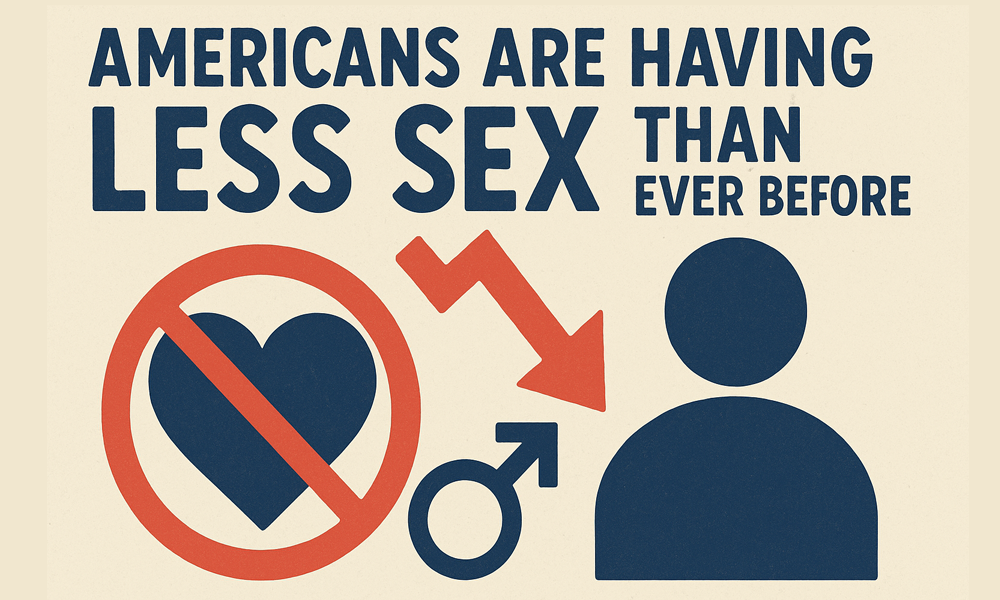News
Americans Aren’t Having Sex Anymore
Exploring the Factors Behind America’s Diminishing Sexual Encounters
In recent years, Americans have seen a significant decline in sexual activity, a trend that is being referred to as the “sex recession.” This phenomenon is not limited to a specific demographic; rather, it spans across age, gender, race, and relationship status, suggesting that the issue is more pervasive than previously thought. A recent study indicates that only 37% of adults aged 18 to 64 engage in sexual activity at least once a week, a stark contrast to the 55% reported in the 1990s.
The decline in sexual encounters is not an isolated occurrence within the United States; it appears to be reflected globally, with even populations traditionally known for their sexual openness, like the French, showing signs of abstaining. This raises important questions about the underlying causes of this trend and its implications on both personal relationships and society as a whole.

Sexual activity is often considered a fundamental aspect of adult relationships, influencing emotional intimacy and connection. With the decrease in sexual encounters, many wonder how this impacts the strength of relationships and marriages.
The reasons behind the sex recession are multifaceted. Factors such as increased screen time, the rise of social media, and changing social norms are all contributing to this decline. The way people connect has evolved, with many choosing to engage in virtual interactions rather than face-to-face encounters. This shift can lead to reduced opportunities for intimacy, as well as a change in how relationships are formed and maintained.
Moreover, the pressures of modern life cannot be overlooked. With demanding work schedules, financial stress, and the responsibilities of parenting, many individuals and couples find it challenging to prioritize sexual intimacy. The busy lifestyles that many lead today often leave little room for the kind of connection that fosters a healthy sexual relationship. As people become more occupied with their daily lives, sexual activity may fall to the wayside, viewed as less of a priority than other obligations.
Interestingly, the decline in sexual activity also raises questions about the role of technology in our lives. While technology has facilitated connections through dating apps and social networking, it can simultaneously create barriers to real-life intimacy. The ease of virtual communication may lead to superficial connections, which do not always translate into physical relationships. This reliance on technology can diminish the opportunities for genuine, intimate experiences that are vital for fostering sexual relationships.

In addition to lifestyle and technological changes, societal attitudes toward sex and relationships have also shifted. There is a growing acceptance of singlehood and non-traditional relationships, which may contribute to the decreased frequency of sexual encounters among certain demographics. As societal norms evolve, individuals may feel less pressure to engage in sexual activity, particularly if they are not in committed relationships.
The implications of this sex recession extend beyond individual relationships. As sexual activity declines, there may be broader societal consequences, including changes in family dynamics, relationship satisfaction, and even mental health. Sexual health is an essential component of overall well-being, and a decline in sexual encounters can lead to feelings of loneliness, isolation, and dissatisfaction.
While it is essential to understand the reasons behind the sex recession, it is equally important to recognize that a strong connection or marriage can exist without frequent sexual activity. Emotional intimacy, communication, and mutual respect are crucial components of a healthy relationship, which can sustain couples even in the absence of an active sexual life.
As society navigates through this period of changing sexual landscapes, it is vital to foster open conversations about sexual health and relationships. Understanding the factors contributing to the sex recession can help individuals and couples find new ways to connect, prioritize intimacy, and strengthen their relationships, ensuring that emotional closeness remains at the forefront.












